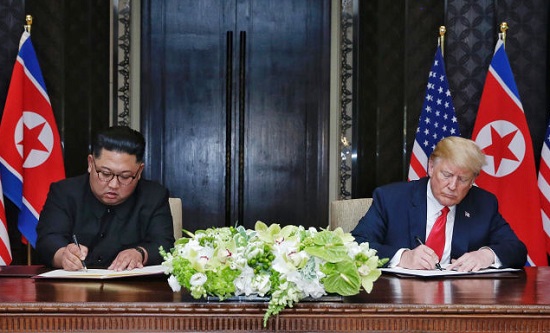
The run up to the on off on summit between US President Donald Trump and DPRK leader Kim Jong Un in Singapore on 12 June saw Trump, Vice President Pence and John Bolton, his fascistic National Security Advisor, threaten that if North Korea didn’t agree almost immediately to destroy its nuclear capabilities then it would end up like Libya, and Kim would face the same fate as Gaddafi. Yet just over one month after the summit Trump told members of the US Congress that there was ‘no time limit, no speed limit’ on the DPRK giving up its nuclear capabilities.
The summit had ended with a joint declaration signed by Trump and Kim which included four points:
- The United States (US) and the Democratic Peoples Republic of Korea (DPRK) commit to establish new US-DPRK relations in accordance with the desire of the peoples of the two countries for peace and prosperity.
- The US and the DPRK will join their efforts to build a lasting and stable peace regime on the Korean Peninsula.
- Reaffirming the April 27, 2018 Panmunjom Declaration, the DPRK commits to work towards complete denuclearisation of the Korean Peninsula.
- The US and the DPRK commit to recovering POW/MIA remains from the Korean War, including the immediate repatriation of those already identified.
The fact that the third point referenced the ‘complete denuclearisation of the Korean Peninsular’ rather than the unilateral demand that the DPRK completely denuclearise was a major political victory for Kim Jong Un and the DPRK. This has long been the position of the DPRK: that it has been forced to develop its own nuclear capabilities is entirely a response to the vast quantities of nuclear weapons that the US has stationed in South Korea. The DPRK will destroy its nuclear weapons and capabilities at the same time as the US and South Korea destroy theirs.
Following the signing of the declaration, unbeknown it seems to both the US and South Korean military, Trump unilaterally announced the suspension of joint military exercises between US and South Korean military forces in the region until at least August.
The next stage in the process was a high-level meeting in Pyongyang on 6-7 July attended by US Secretary of State Pompeo, which was supposed to begin the implementation of the ‘new relations’ talked of in the declaration but which ended with the DPRK accusing the US of behaving with a ‘gangster-like mindset’. This was in reference to a US demand that the DPRK destroy its nuclear capabilities without any reciprocal action from the US. As the DPRK statement after the meeting put it:
‘the US side came up only with its unilateral and gangster-like demand for denuclearisation just calling for CVID (complete, verifiable, irreversible disarmament)… all of which run counter to the spirit of the Singapore summit meeting and talks … We thought that the US side would come with a constructive proposal which accords with the spirit of the summit meeting and talks. But expectation and hope of ours were so naive as to be foolish.’
The DPRK put forward a number of practical proposals to the meeting including suggesting the US making a public declaration ending the war with the DPRK on the 65th anniversary of the signing of the Korean Armistice Agreement which falls on 27 July. In response the DPRK would dismantle the test ground of the engines used in its Intercontinental Ballistic Missile programme and begin the practical steps needed for recovering and repatriating the remains of US military dead still in North Korea. Immediately after the talks US Secretary of State Pompeo flew to Tokyo to brief the Japanese Prime Minister where he declared that the talks had gone well but reiterated again that the DPRK had to completely denuclearise and that economic sanctions against the DPRK would remain until that happened. However, maintaining its commitments, the DPRK commenced decommissioning of its Sohae rocket test base on 24 July, and started handing over the remains of US servicemen two days later.
The polar opposite content of the statements made by Trump before the June summit and then to members of the US Congress in July reflect the problems facing US imperialism as the DPRK sticks to its consistent and principled position that it will only denuclearise as part of a comprehensive package to denuclearise the whole of the Korean peninsular.
Bob Shepherd




